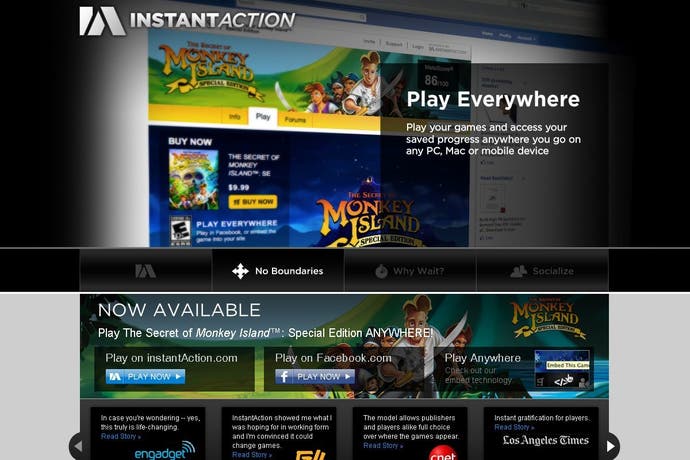InstantAction's Louis Castle
Why Call of Duty will end up in your browser window.
Louis Castle's been around the block. The American videogame designer co-founded Westwood Studios, which, as all real-time strategy fans know, created the groundbreaking Command & Conquer series.
He stayed on when EA bought Westwood, eventually becoming a big cheese within the publishing behemoth when it closed the studio in 2003. Then, in 2009, Castle joined InstantAction as CEO, and set about changing the way we play games.
This morning Castle kicked off the Develop Conference in Brighton with a keynote entitled "Traditional Games Breaking into Social Networks: A View from the Frontline". Here, speaking to Eurogamer, Castle explains how he's going to rid gaming of piracy and why we'll all be playing the next Call of Duty game for free in a browser.
My keynote is about traditional gaming. Any kind of game can be distributed through the web, if you're willing to approach it in a different way. Eventually the same kind of content we see in consoles and on PCs for dedicated download is going to be available through web browsers.
I know that's the case. I wouldn't even say it's probable. It's going to happen. I know it's going to happen because all the different companies are announcing initiatives, like Google with their native client stuff they want to do, and all these various companies all saying, 'Well we want to support 3D through the browser'. Even Flash is trying to get better 3D support through the browser.
The difference is all of those different initiatives are individual one-offs, and they're a very small fraction of an already fragmented and heavily pirated market. So it's very challenging to get any publisher that's spent $60-70 million building and marketing a game to want to put it into a place where it's basically going to get stolen and given away for free.
It's very analogous to the music industry. So my keynote, in one sentence, is talking about all the different barriers that exist for high-quality published games to make it into the web, both technical and market barriers, and what we are doing at InstantAction to try to bridge that gap.

I think it'll happen, on PCs, Macs and consoles. It's going to happen across the board. At GDC we were showing demonstrations of InstantAction playing Assassin's Creed II. We've put Crysis on there, Call of Duty, all of these great games you would think, 'Oh my God, that's never going to work.' But we have them all working in a browser.
And we're talking to a lot of publishers out there. They're understandably concerned and nervous. They want to see the platform out there, well distributed, successful. We've got some announcements at PAX [Penny Arcade Expo] in September and hopefully some more following that over the fall.
Correct. To be clear, we partner with Gaikai for thin client. InstantAction as a platform offers thin-client play that masks a progressive download. The progressive download can happen in a very short period of time relative to the game size.
In the case of something like an Assassin's Creed or a Call of Duty, it might be a couple of hundred megabytes or more. It could take as many as 20 minutes, maybe 30. So during that time we serve a Gaikai feed that lets you play immediately. And while you're playing the Gaikai feed we're downloading the game in the background. As soon as the game is on your system and ready to run, we then switch you over to play on your system, with a free trial for some period of time that's up to the publisher.
After the free trial the publisher has lots of options on our platform on how they want to charge the customer. They can do a cliff purchase, which is what Secret of Monkey Island is doing right now. Or they could do rent-to-own, which we don't think works as well. So you're paying, say, $10-an-hour, and that $10 is coming off the purchase price. So if you've spent five hours for a $50 game, you've bought the game. You never have to pay after that.
They're playable through the browser, full screen, as well as a browser window. Games can actually talk to the browser and talk to things that are inside the browser, which is nice. Your friends list can be your Facebook list, which is a lot nicer when it comes to finding somebody you want to invite. You can create a Facebook group that is your Call of Duty friends, if you will. You then look to that group and invite people inside that group to play synchronously online. It does all the connections in place at 100 per cent of the game speed.

